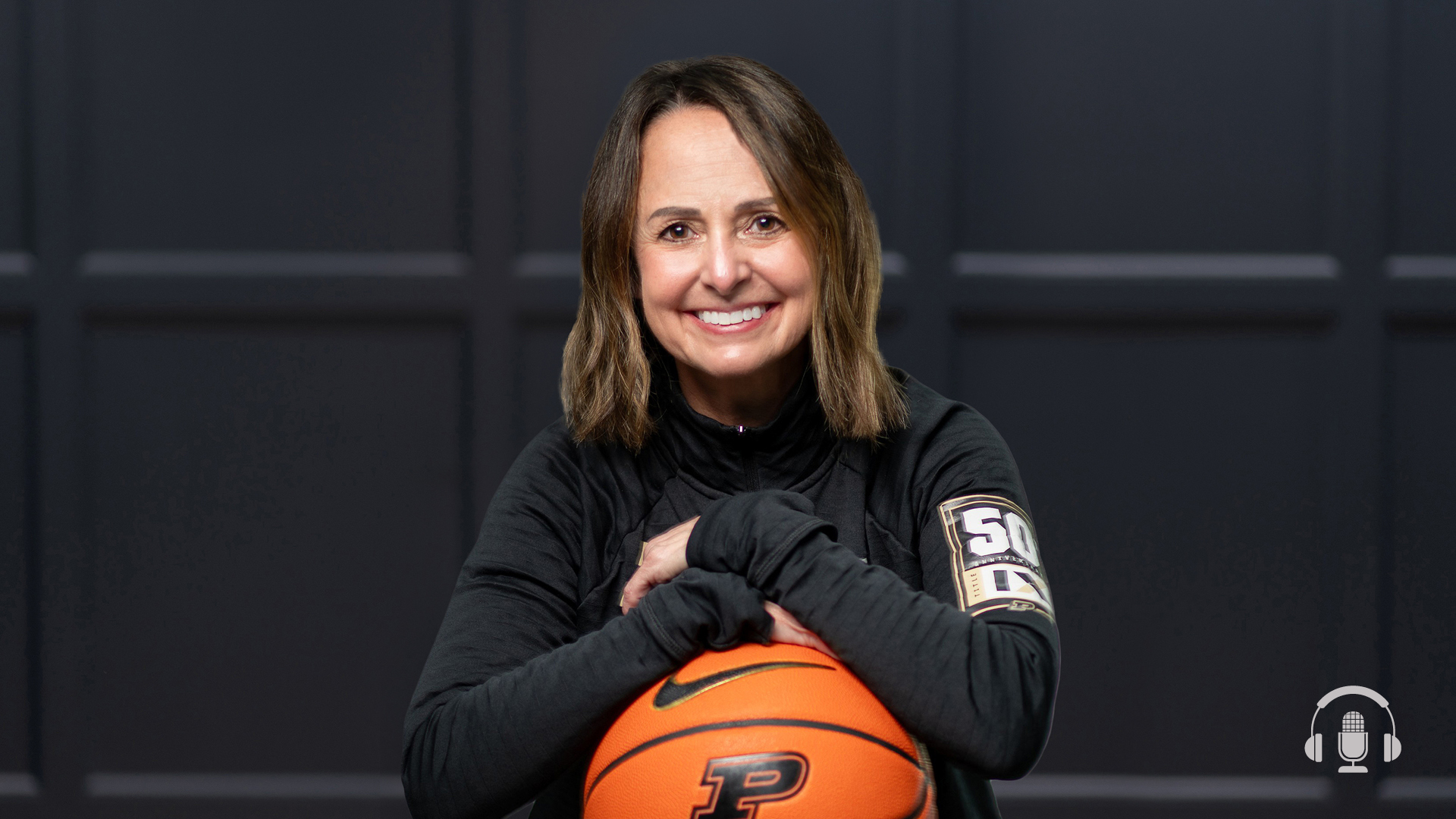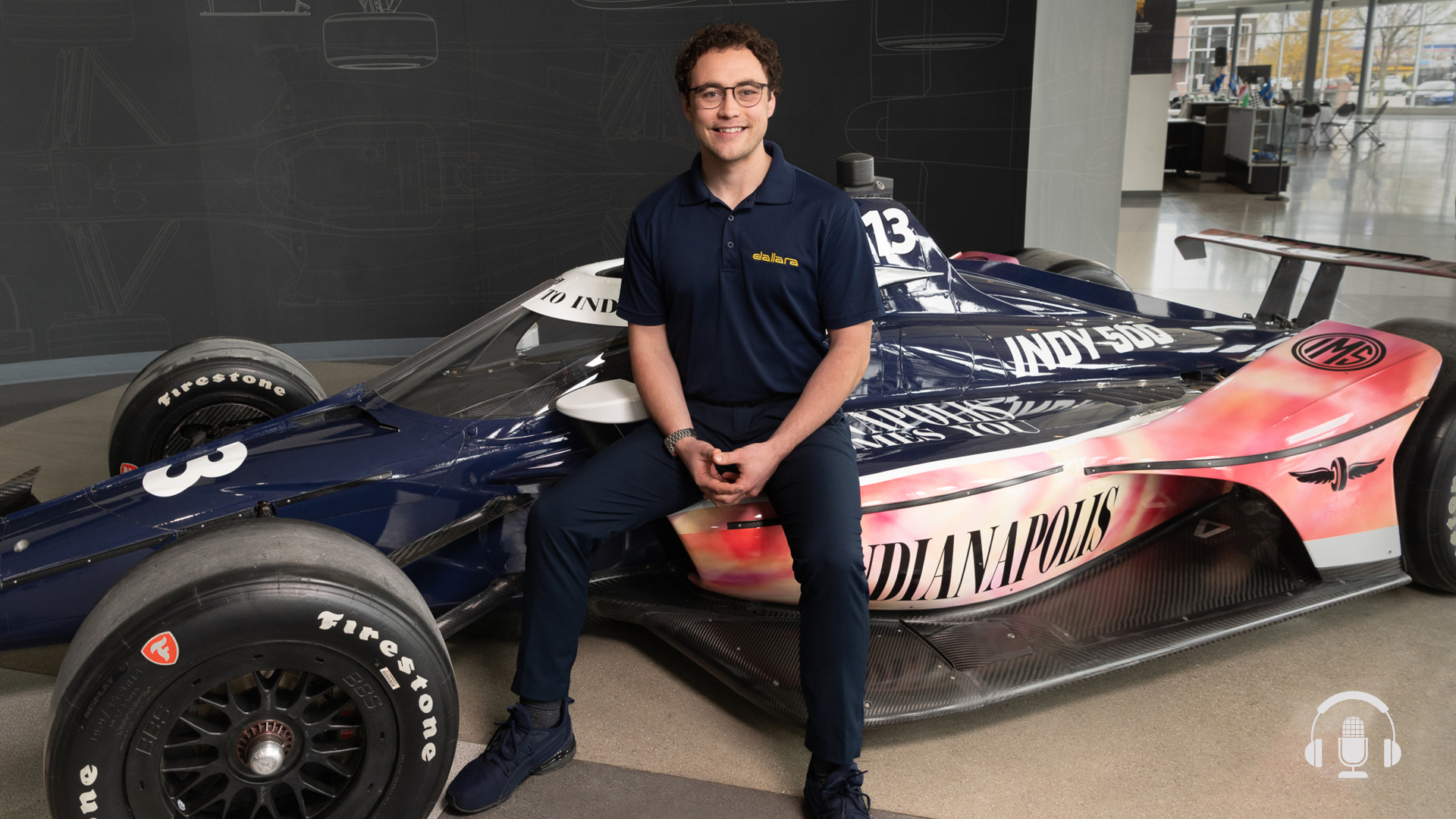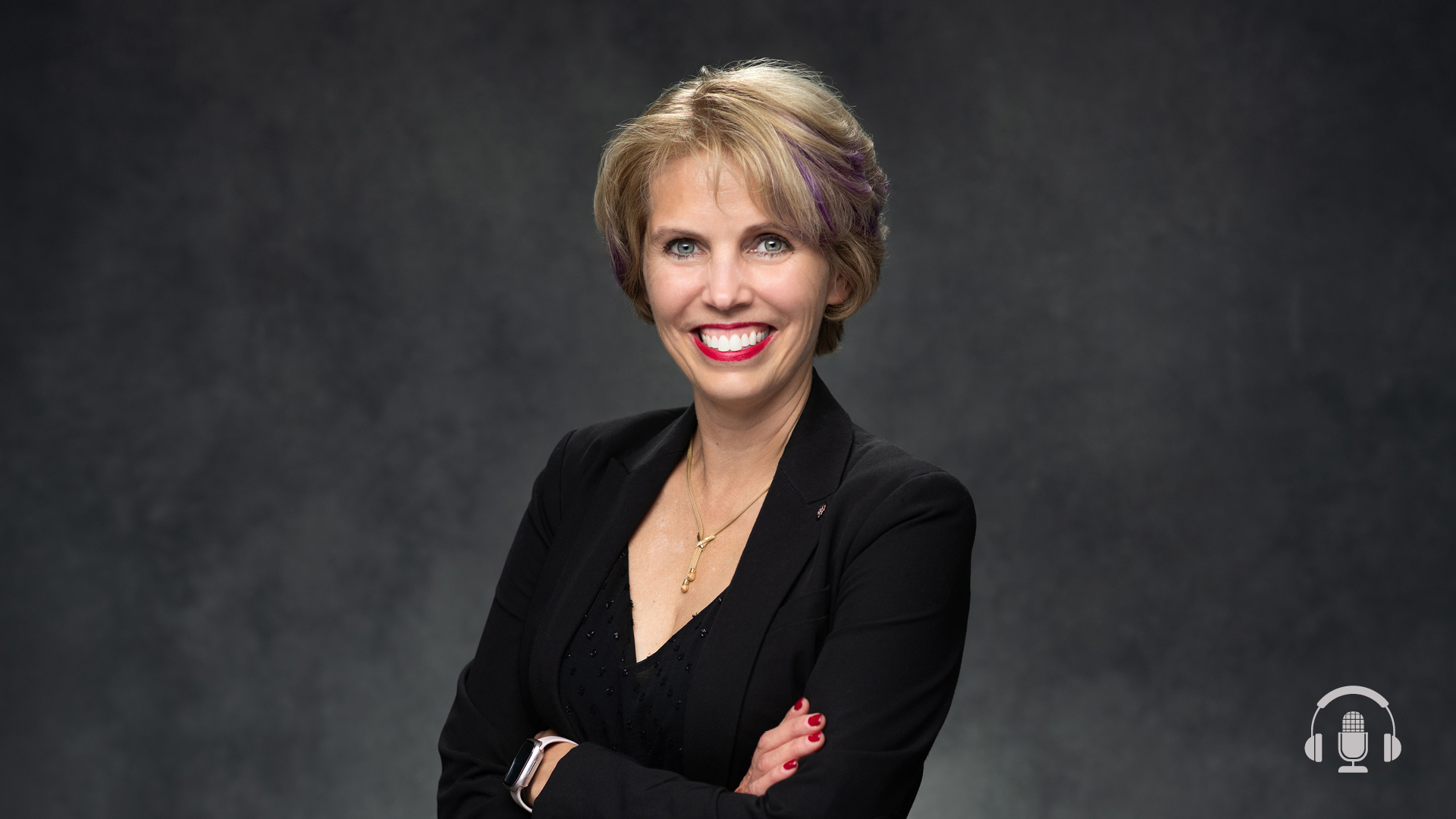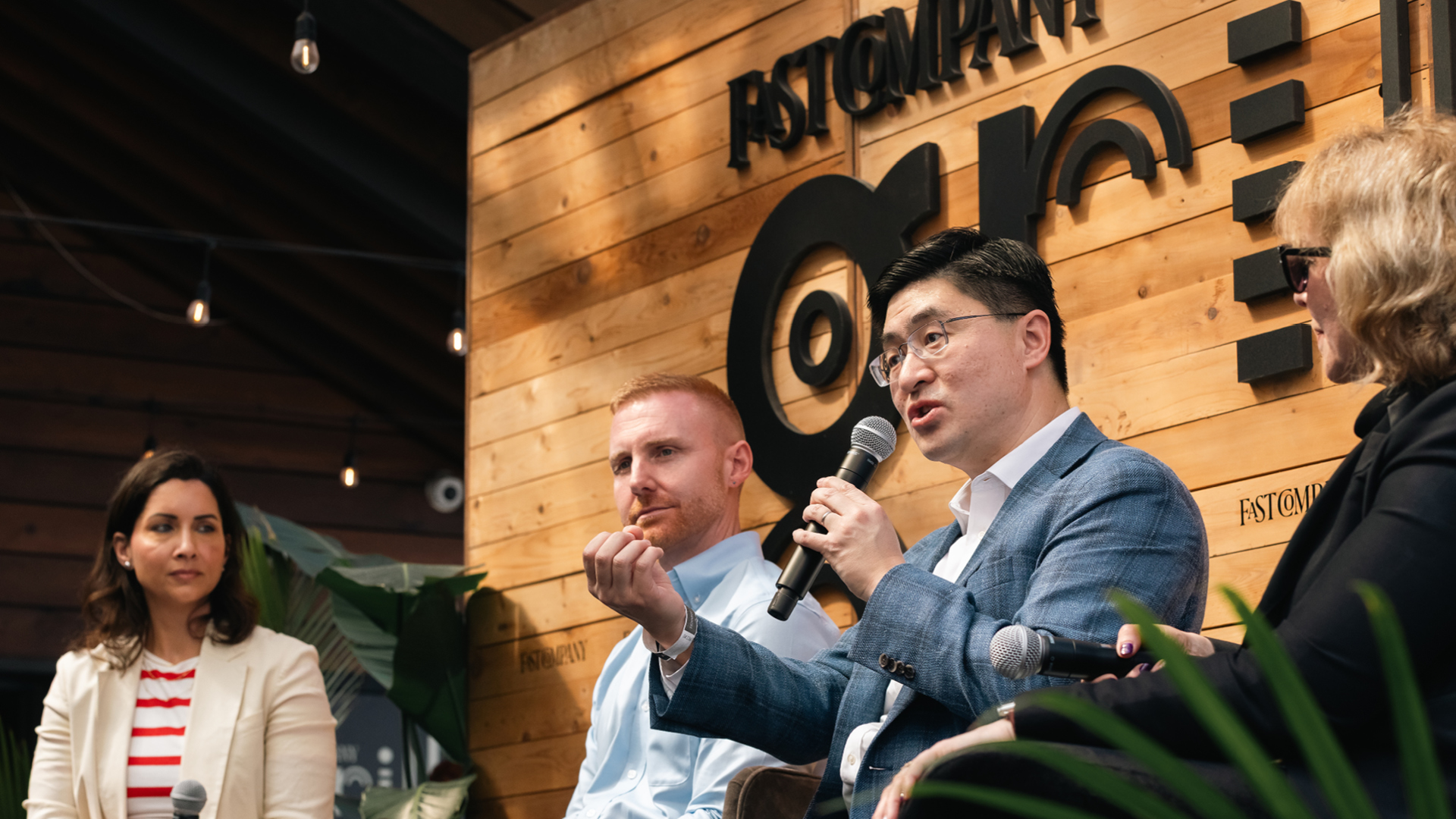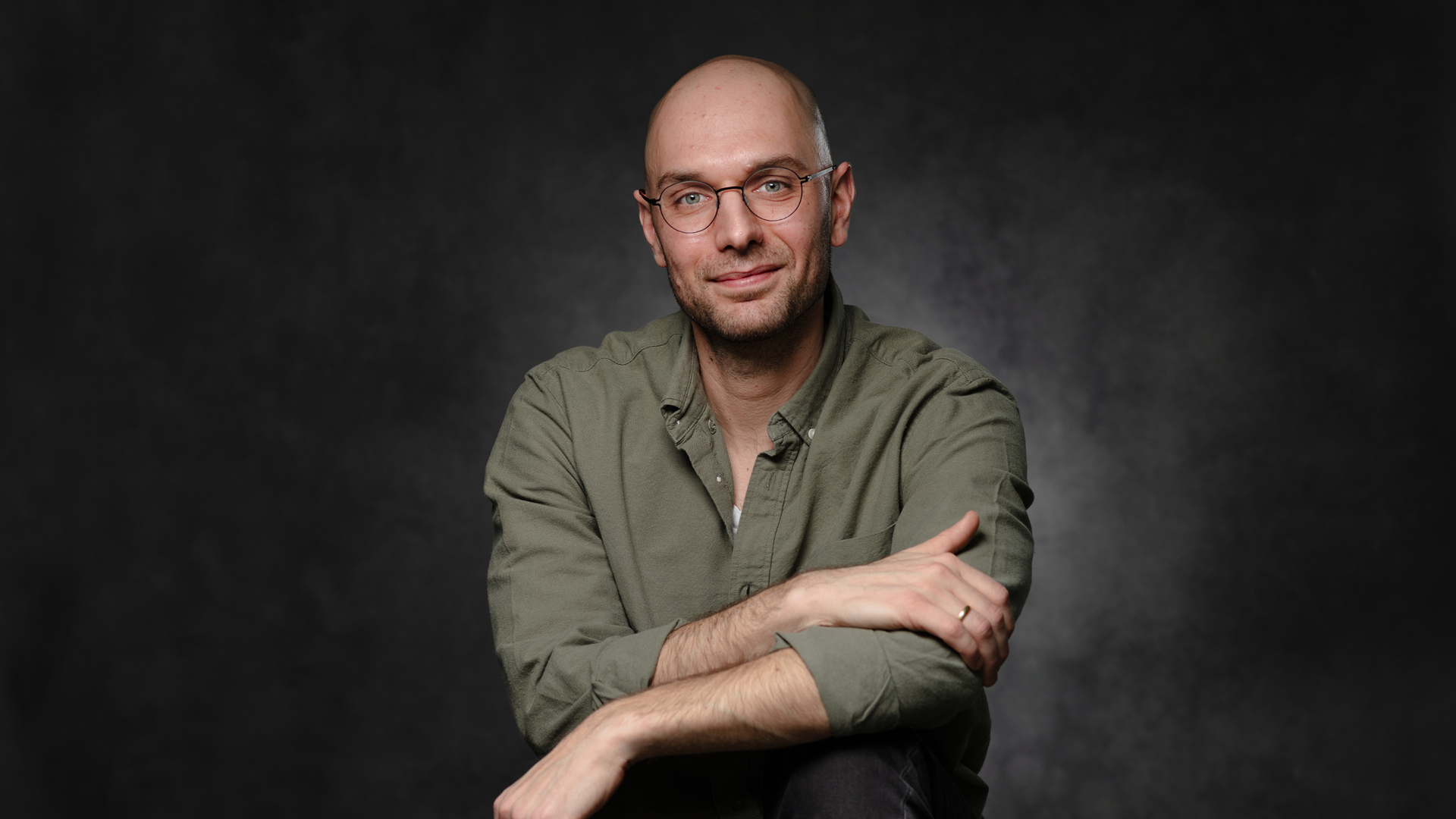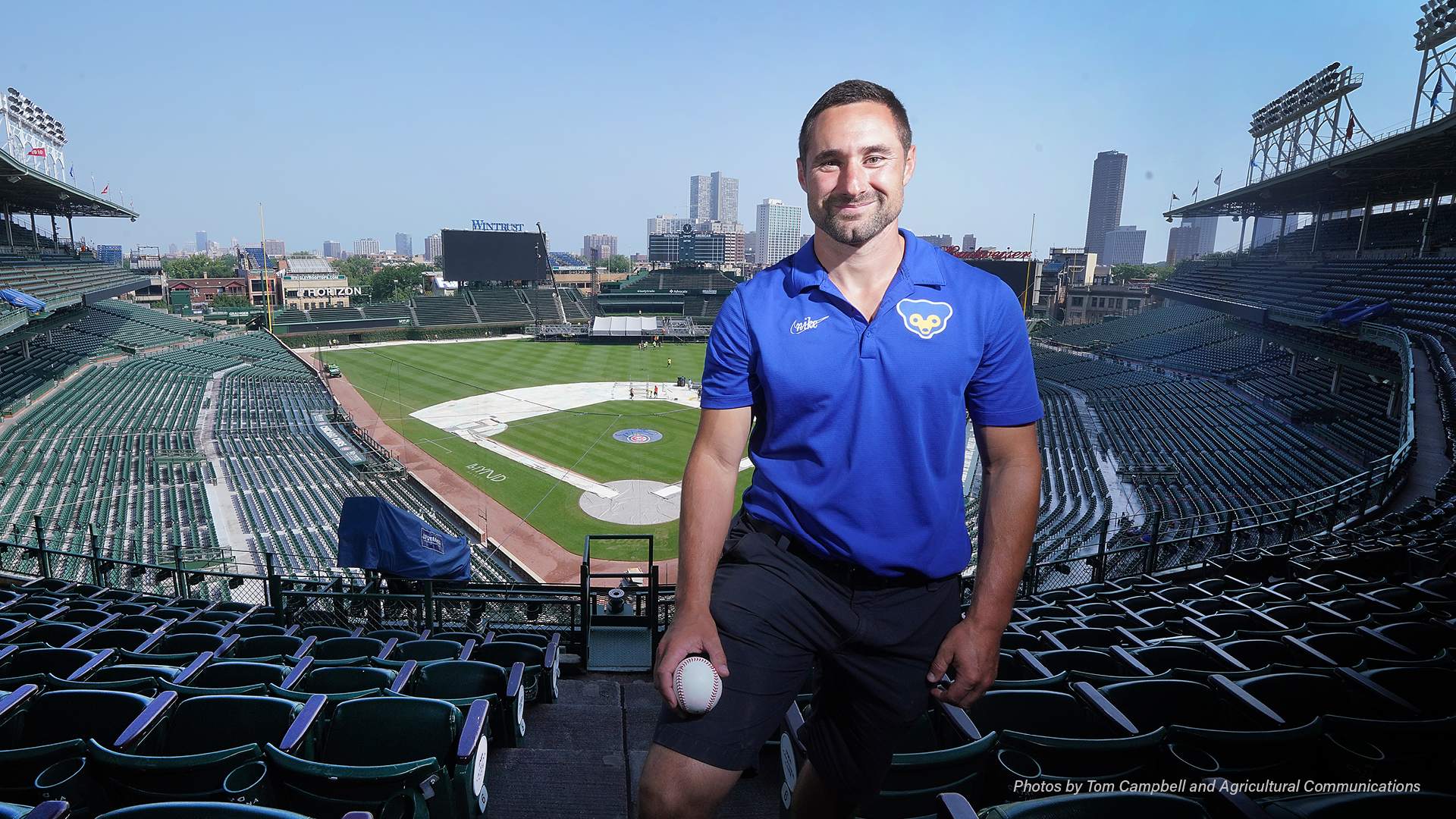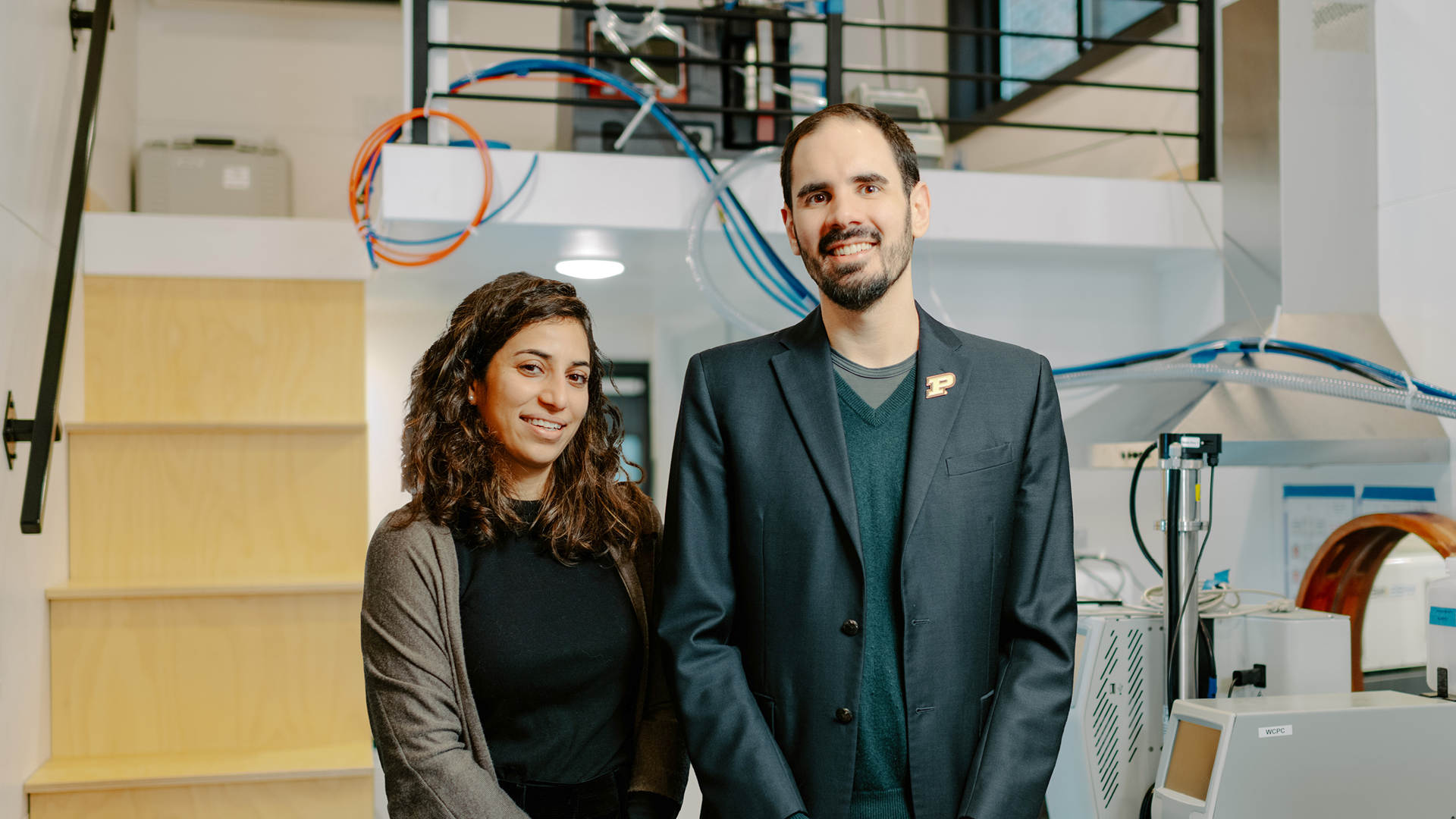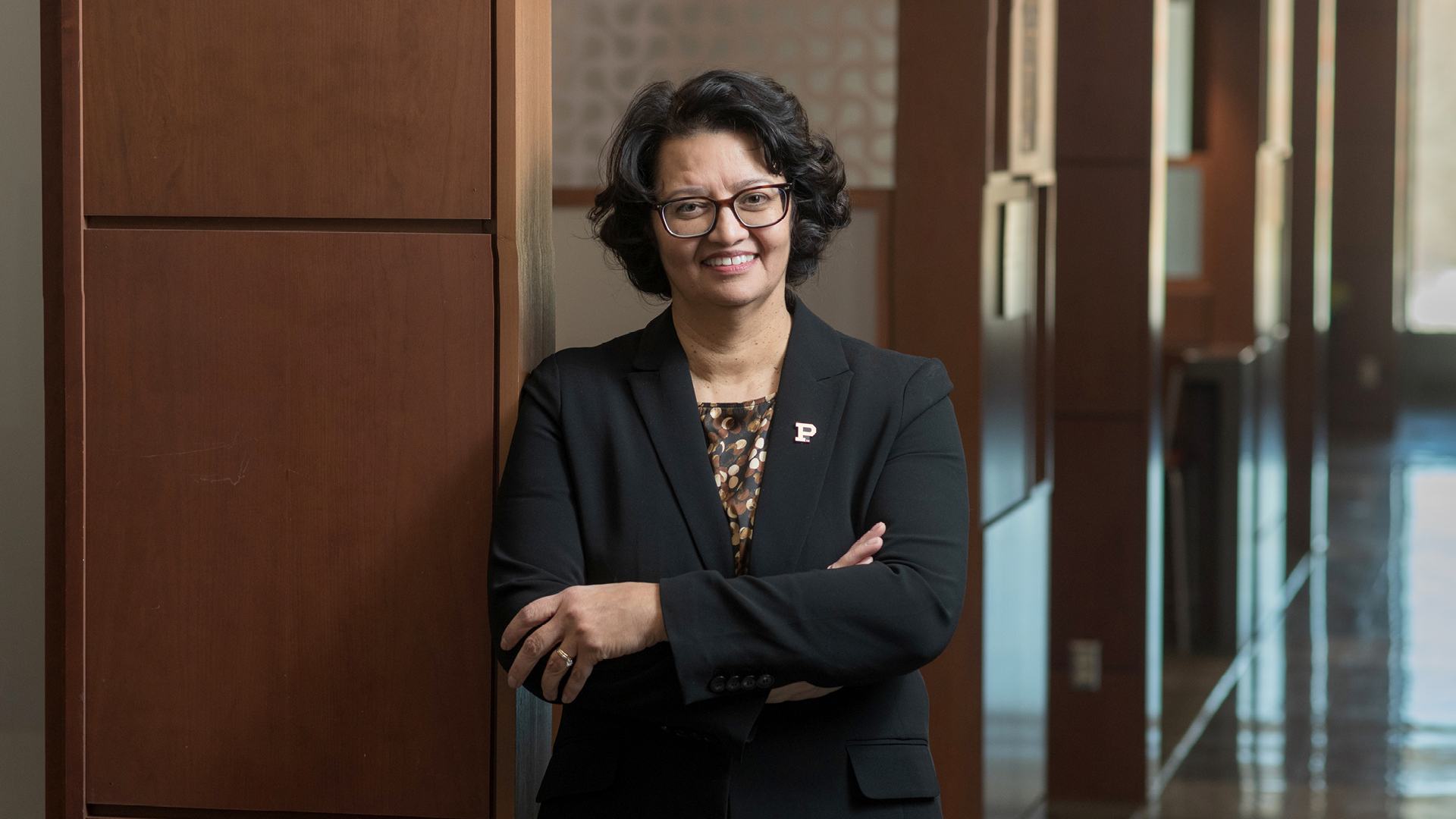Podcast Ep. 94: ‘Piano Man’ Bruce Barker on His Purdue Experience, Playing in Front of Millions and Retirement
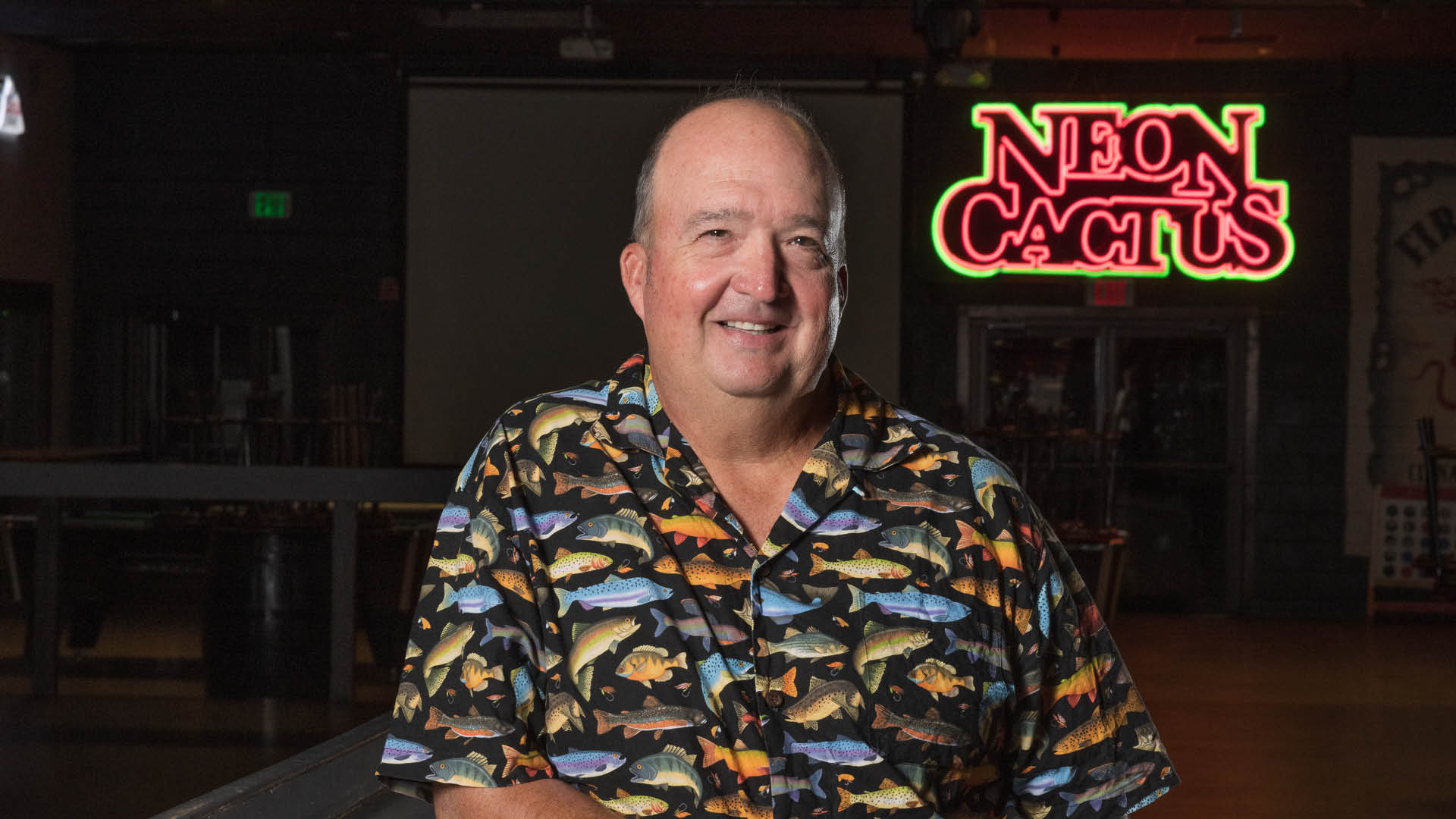
In this episode of “This Is Purdue,” we’re talking to Purdue’s “Piano Man,” Bruce Barker.
Despite growing up in Lafayette, Bruce didn’t see himself attending Purdue. He wasn’t the best student while in school, and he didn’t peg himself as someone who would succeed in college.
But after high school, he struggled to find meaningful work without a college degree. On a whim, he applied to Purdue. Pretty soon, Bruce was auditioning for the Varsity Glee Club, teaching himself to play piano and reinventing himself as the person we’ve come to know and love for decades — Purdue’s “Piano Man.”
In Bruce’s nearly three decades on the stage, he has become a beloved fixture in the Boilermaker community, attracting thousands to his weekly shows and even inspiring alumni to return from as far away as Georgia, Colorado, Florida and Texas.
Tune in to discover how Bruce got his job at the Neon Cactus, his favorite memories from performing in front of millions, the story of the night he met his wife during a performance, what it meant to give back to Purdue during the pandemic — and why he’s decided to hang up the mic at the end of the 2023 fall semester.
- Follow Bruce Barker on Facebook
- Follow Bruce Barker on Instagram
- Learn more about the Neon Cactus’ September 2022 re-opening
- Follow the Neon Cactus on Facebook
- Learn more about the Purdue Varsity Glee Club
- Learn more about Purdue Musical Organizations
Full Podcast Episode Transcript
Bruce Barker:
Love you, Boilermakers. This is Bruce Barker, Purdue’s Piano Man, and you’re listening to This Is Purdue.
Kate Young:
Hi, I’m Kate Young, and you are listening to This Is Purdue, the official podcast for Purdue University. As a Purdue alum and Indiana native, I know firsthand about the family of students and professors who are in it together, persistently pursuing and relentlessly rethinking. Who are the next game changers, difference makers, ceiling breakers, innovators? Who are these Boilermakers? Join me as we feature students, faculty, and alumni taking small steps toward their giant leaps and inspiring others to do the same.
Bruce Barker:
There became a time when you get here at 7:00 and the lines are already formed. And you’re like, they’re not here because of the drink specials, or they want to run to the dance floor. I’ve always just been so thankful and appreciative that a thousand people on a Thursday plan their night around me. What an amazing, amazing gift and blessing.
Kate Young:
Does this voice sound familiar to anyone? In this episode of This Is Purdue, we’re talking to Purdue’s Piano Man, Bruce Barker. Now, this episode is extra special for a few reasons. One, the podcast team was able to go onsite and interview Bruce at the Neon Cactus. Two, our team also got to attend his live show on a Thursday night. And three, this Boilermaker legend is retiring at the end of 2023. So we’re celebrating his career and the impact he’s made on so many Boilermakers over the past 30 years.
Now, if you haven’t been to one of Bruce’s shows before, or maybe it’s just been a while and you need a refresher, this Purdue alum plays the piano and sings popular songs from pop to country to rock and roll. But these aren’t your average throwback songs. See, many of them have a Bruce Barker twist, like Wagon Wheel, for example. There’s an edition that show goers like to add to the chorus.
Yes, you heard that right. I just got very publicly shamed by the Piano Man himself for marrying an IU Hoosier. Yeah, I guess I deserve it. Then there’s the late Jimmy Buffett’s Margaritaville.
And another one of Jimmy’s songs Come Monday.
So in this episode, we’re diving into Bruce’s story, from growing up in Lafayette to applying to Purdue on a whim, to teaching himself to play the piano, to today having played for millions of people from all across the world. We’re so excited for all of our listeners to get to know Bruce on a more personal level. Let’s get into it.
Bruce Barker:
Okay, just Kate. Hi, Kate.
Kate Young:
We’ve already had some fun today.
Bruce Barker:
We’ve had a ton of fun.
Kate Young:
We’ve had some fun, but I want to get started with our official university podcast, This Is Purdue.
Bruce Barker:
So flattered to be asked to do this.
Kate Young:
Oh, we’re thrilled to have you. I know everyone is excited for this episode.
Bruce Barker:
Oh gosh.
Kate Young:
Let’s go back to your Purdue journey. When did you first find out about Purdue? What made you want to come to Purdue as an undergrad?
Bruce Barker:
So John Purdue and I went to high school together. No, I’m from this town. So I grew up as a Boilermaker basically. It was either that or Ivy Tech, and I chose to root for Purdue. And I thought pretty campus. But I also was never going to go to college. I had no intentions of going to college ever. I was just going to get my high school diploma and then go out into the workforce. And then you know what happens amazingly is when you have two jobs, you’re living at home and all you have is a car payment, if you don’t have a college degree, sometimes you can’t make ends meet.
And so I called up my best friend Sid. I said, “Hey, man, let’s go to college.” He says, “You’re stupid.” I said, “No, man, seriously, let’s go to college.” He goes, “Okay.” So we took the SATs. And I have no business ever getting into Purdue, to be honest, with my high school academia background, but I had a friend who had a friend. And I think they kind of just said, “Roll the dice and see what happens with this kid. It’s not going to hurt anything.” And then when you get in, you realize there’s a lot of opportunities here that go beyond books.
For instance, I sang in the Purdue Glee Club. And I had never been on vacation. I went to Florida one time in my whole life at age 19. And so we were able to, Purdue Glee Club, travel the world, and I’m like, I’ll wear a tuxedo to travel the world. So I made the group.
Kate Young:
So what made you want to try out for the Glee Club? Did you immediately get to Purdue and see the signs and you’re like, I have to go try out for this?
Bruce Barker:
That’s such a great question. Again, not giving a poop about high school, I made my schedule three days before school started. And so when you make your schedule three days before school starts, there’s not a lot of options. And so while I’m talking to my counselor, I said hey sort of cockily, “Who are the best singers on Purdue’s campus?” And she said, “Hands down, the Purdue Glee Club.” Lived here my whole life, never heard of the Purdue Glee Club or PMO. Never been to a Christmas show.
You got a picture of this. I know it’s hard, but I had hair that you could pull on from behind, and I had an earring, and I had a Billy Idol t-shirt on. And I may or may have not have been hungover, but I went to the Glee Club tryouts and there were these guys in suits. And here I’m in my Billy Idol t-shirt. They had all this prepared opera music and I didn’t have anything prepared, but they told me that they travel the world. And I’m like, man, I’m in. I want to see some stuff. I was the last one to go to try out that day.
So these guys were all doing the opera. [Singing 00:07:17] So I just went to the piano play… That was professional, by the way. That’s Italian. You probably don’t understand it. But I went to the piano player Didi at the time and I said, “Do you know Summertime from the musical Poor Game Best?” And she’s like, “In what key, darling?” And I’m like, “I don’t know. I don’t read music.” So I go, “Summertime,” and she’s like, “Oh yeah, F Sharp. Got it.” I’d never seen that. Never seen that. I sang in high school, but I’d never seen anybody just go, “In what key, darling?”
And so I did my thing and made the Glee Club. Didn’t know. I knew it was a famous group and I learned a lot about it later, but they 100% were my Purdue education. Why is that? I had access to a piano for the very first time in my life. At any time I could check out a key, go to my own little private practice room. A lot of people don’t know this, Kate, but I didn’t touch a piano until second semester of my freshman year. We never had any money growing up, so we didn’t have any instruments.
And so I’m like, man, I think I want to teach myself an instrument. And so I took my Sony Walkman headphones and my cassette player and two sets of batteries, and I started at 11:00 AM and I finished at 7:00 AM or 7:00 PM. But by the end of the time, I could play one song with both hands. And I’m sure it wasn’t perfect, but people would walk by and knew I was playing All Cried Out by Lisa Lisa and Cult Jam. And girls talked to me, so I was like, that’s kind of cool, right?
Kate Young:
Got to keep up with this piano thing.
Bruce Barker:
Yeah, acknowledge my presence. That’s the story of the first time I sat down at a piano and taught… And that was 100% inspired by PMO and Purdue, and that’s probably why I am a thankful Boilermaker and love Purdue.
Kate Young:
It was interesting learning that despite growing up in Lafayette, Bruce didn’t see himself attending Purdue. Can you imagine if he hadn’t? I think it’s safe to say we’re all very happy that Bruce became a Boilermaker. Bruce explains more about his journey after graduation. So fast-forward, you graduated from Purdue, what was your job after college? How fast did you get into this entertainment world?
Bruce Barker:
Well, I graduate with the exotic degree of recreation management. Now, the epitome of success in recreation management, just like Parks and Rec the show, is a whole city’s parks and rec department director, but it takes decades to get to the top. And so I didn’t have a job right out college. That’s poor on my part. We’ll hit silent. Sorry about that.
Kate Young:
Isn’t this the part where I yell at you for having your phone? Okay, so Bruce’s phone rang in the middle of the interview, and yet he calls people out for being on their phones during his shows?
Bruce Barker:
All right, everybody point. Everybody point, point, point. You suck. You suck. You suck. Point. You suck. You suck.
Kate Young:
All right, all right, we’ll let it slide this time, Bruce. Back to the interview.
Bruce Barker:
So as soon as I graduated, I didn’t have a job in my chosen major, and so I was getting married, and so I took a job checking fire extinguishers. And it’s brainless and it takes almost no talent. But what it did was it allowed me to see that I need to aspire to maybe do something better. That’s kind of a long story, but I sang karaoke all through college. My med money was I won karaoke contests. So the owner of the karaoke bar says, “Hey, you’re in that Glee Club at Purdue, aren’t you?” Yes, sir.
“Well, I’m looking for a piano player because I’ve opened a bar across the street and I need a piano player to play music while people eat steak and chicken.” And I’m like, “Well, sir, I play piano,” and he’s like, “No way.” So he walked me over, he had a $10,000 Yamaha piano. So here I am checking fire extinguishers Monday through Friday. Friday night and Saturday night I’m playing music to digest to upstairs at Captain’s Cove for $12 an hour. What. What.
Kate Young:
Wow.
Bruce Barker:
Yes, professional piano player. And then what he didn’t count on… Because what I didn’t tell you is I was on the second story, the lower story was a comedy club, so it was dinner and a show here in Lafayette. So it was kind of a neat thing for Fridays and Saturdays because it was an extra 20 bucks, $10 per person to go down and catch the comedy show. What he didn’t count on was not everybody wanted to drop another 20 bucks, and he also didn’t count on people wanting to stick around and have a few cocktails after they had their meal.
What he also didn’t count on is that they’d be like, “Hey, piano guy, can you play Brown Eyed Girl? Here’s five bucks. Can you play Piano Man? Here’s five bucks.” He didn’t count on that. So I almost immediately became in direct competition, not because I wanted to, but it happened naturally with the comedy club downstairs. And then the guy who was the manager… This room right here was empty for the first almost two years of the Cactus’ existence. The manager at the time here went to my high school and he got wind…
They couldn’t find a piano player for this room. They tried Indie in Chicago, couldn’t get anybody to drive to Lafayette. Exotic Lafayette, I don’t get it. But he came and caught a show after he had his steak, and then he was like, “You need to talk to my bosses because we have a room that would just be this, what you’re doing.” And so he introduced me to Jim and Sheila Cochrane. I was hired that day. This is what an astute business person I am. And I told you I’m making 12 bucks an hour to play piano at the other place.
Well, I’m getting interviewed. Let’s say you’re Sheila. She says, “What are they paying you over there at Captain’s Cove?” And I got a little chesty. I was like, “12 bucks an hour,” and she said, “What if we gave you 12.50?” I’m like, that would be a raise. And so that’s what kind of businessman you’re working. You know how your husband’s a statistician? Yeah. He would appreciate the sleuthness of my amazing bargaining abilities.
Kate Young:
There was no negotiating.
Bruce Barker:
No. I was like, I just got to a raise.
Kate Young:
And so Bruce’s career at the Neon Cactus kicked off. Bruce walks us through his first night performing at this iconic Boilermaker nightclub, which back then was purely a country bar.
Bruce Barker:
This was a country bar. I know five country songs ish. 99.7% of that dance floor was filled with country people to the… I mean boots. I mean, you name it, whatever the Bon Jovi stuff is, the little tassels. And people would walk through here and hear Elton John and be like, “I’m going to keep on walking.” But eventually a couple of them got tired of dancing or had a husband that didn’t like to dance, so the opposite sexes were coming here.
It just started to snowball a little bit. The first show, I believe I got $17 in tips, if I remember correctly. What a windfall. But it was just a lot of fun. And again, I was getting paid to play piano. And I’m telling you, if I had 10 million bucks in the bank, I would’ve still done it for free or 12 bucks an hour. 12.50.
Kate Young:
12.50.
Bruce Barker:
Yeah, 12.50.
Kate Young:
How has your experience changed throughout the 28 years? When was the first time that you were like, “Oh, people know me?”
Bruce Barker:
Okay. Yeah, that’s a great question. And again, I’m not a real big like me, me, me, but I will tell you there was an aha moment. Graduation weekend. Probably, let’s see, I started in… It was before 2000. I’ll say ’98, ’97. And graduating seniors came down in their cap and gown on Saturday night after graduation and they said, “You’re not going to believe what happened at our graduation today. They asked all of us to name five things that they’re going to miss about Purdue, and you were like number two on the list,” when the senior gives the senior speech, whatever that’s called.
Kate Young:
Commencement speech.
Bruce Barker:
Yeah, the one senior that’s picked to speak on behalf of the class. She said, “Here’s the five things, and it was like Harry’s and the Fountain and Bruce the Piano Man at the Cactus.” And I thought they were not telling the truth. It just seemed too crazy, but that was an aha moment when you realized you’re impacting some lives. And what a blessing.
Kate Young:
Okay, so like I said at the beginning of this episode, the This Is Purdue team got to spend a Thursday evening experiencing Bruce in his element during his live show.
Bruce Barker:
So, have you noticed anything different? Do you guys notice any cameras cruising around the room? So, Purdue Marketing is here tonight. They’re doing a special show. Purdue Marketing, the show This Is Purdue asked if they could interview yours truly. So they are here. They’re filming what’s called B roll in the industry. Boilermakers, if we’re going to do a country music song, I got to hear yee haw. All right, I would love it if you clap. Which side of this room is going to be the party side?
Kate Young:
One of the very first requests of the night was none other than John Denver’s Country Roads Take Me Home, which Bruce even choreographed some special dance moves for.
Bruce Barker:
Also known as Country Roads. Now, friends, this is Logan’s first time, so I want y’all to teach him the magical dance that I invented and I created. If you’re a Boilermaker, get off your beep.
Kate Young:
Bruce tells us more about the special traditions that he’s created over the past three decades. Okay, so walk us through. You have certain rituals and traditions. I personally have not seen you in probably 11, 12 years.
Bruce Barker:
That’s good. You should take decades off.
Kate Young:
Well, I’m going to refresh my memory tonight.
Bruce Barker:
Oh, promise.
Kate Young:
Tell us how you come up with these. How are some of these iconic traditions formed right now?
Bruce Barker:
Wouldn’t you say the big one is my little catchphrase? When I say social and everybody drinks at the same time. Peer pressure. I just came out of that spontaneous and it caught on. That’s kind of a neat little thing that’s mine. I will tell you this, I have people still reach out to me and tell me they don’t know the real words to a lot of the songs. When they go and they hear them, they’re like, “Oh yeah, that Bruce song. Oh yeah,” and they sing the…
Kate Young:
Pretty version.
Bruce Barker:
Yeah, colorful words or my version. That’s pretty cool.
Kate Young:
That’s awesome.
Bruce Barker:
Again, those are moments that are born out of spontaneity. And then when something sticks, that’s pretty cool and I hang my hat on that.
Kate Young:
What about the choreography? How are you feeling up there when people know your moves?
Bruce Barker:
So my wife is a choreographer. She has taught dance since she was 12 years old.
Kate Young:
Oh my goodness, like a real choreographer.
Bruce Barker:
Yes, a real choreographer, tap, jazz, lyrical, funk, hip hop, she does it. Everything but ballet. So I just decided one night I was going to make up sign language for country roads. I’ll be doggone if it didn’t absolutely stick. And my goal is, I hope, I hope that I’m 91 years old in an assisted living program and they bring in the little entertainment person that’s going to lead bingo or whatever.
And before they start it, they start do some songs. I hope one person just spontaneously doesn’t know me, but starts doing the Country Roads. I pray that I see that most selfishly. I selfishly hope I get to see that moment because I think that would be kind of cool too.
Kate Young:
Now Bruce has become a beloved fixture in the Boilermaker community, attracting thousands to his weekly shows and even inspiring alumnis to return to West Lafayette from as far away as Georgia, Colorado, Florida, and Texas. Bruce describes the feeling of performing at the Neon Cactus in front of a packed crowd. What’s the feeling like up there on a Thursday? People are trickling in and then all of a sudden it’s packed.
Bruce Barker:
It used to be the first night when I made 17 bucks, you kind of hoped that people would just keep trying you out, right? But there became a time when you get here at 7:00 and the lines are already formed and you’re like, they’re not here because of the drink specials, or they want to run to the dance floor. What an amazing… And I know you don’t know me very well, but I hope that I come across as humble because I’ve always just been so thankful and appreciative that a thousand people on a Thursday plan their night around me.
What an amazing, amazing gift and blessing. And so I try and honor that by I have never mailed in a show. I have a kamikaze housefly trying to get me, but I’ve never mailed in a show. I’ve been sick a lot of times and I’m not trying to look for a aw, but I would tell you, if I wanted to, I could put it on autopilot and be like, “All right, here’s 10 bucks for Bon Jovi. Let’s go. I’m going to play it. You guys sing it.” You can do that, but I’ve always come from a different philosophy about piano bars.
When I was 21, I would go to Indianapolis and watch these dueling piano bars and the things that really rubbed me wrong about them… They were talented, super talented. You line up 100 of those piano players, 99 of them are going to absolutely kick my butt, but that’s not what I think is important. What I’ve always thought was important is you do the song that somebody pays you five bucks for. You do it the way you think they’re going to want to hear it. So what does that mean?
You don’t do it twice as fast. You don’t cut it in half. Don’t take advantage of their money because the clientele in my room is 90% college students, and I knew how much money I had in college. I didn’t have any. And so I try and earn because I’ve been there. We don’t do the fight songs 30 times a night. We don’t do country versus rock and roll just to see how much money you brought into the piano bar that night because I want to put it in my pocket. I’ve always come at it from a different philosophy.
I feel like if you come and you give the people… You make them feel special somehow. You try and touch as many as you can. But if you make somebody feel special, they’re going to want to come back. I don’t want a college person waking up the next day and be like, “Oh my gosh, I dropped 50 bucks on the piano guy. I can’t afford to go back for a month.” I’d rather you spend 10 or 15 or less.
Don’t spend any. But if you want to hear your song, you want to have a couple drinks, I’d rather have you drop 10, 15 bucks and be able to come back the next week. That’s been my philosophy from the get-go.
Kate Young:
And speaking of making Boilermaker students feel welcome and want to come back for the next show, Bruce shares a bit more about his free show routine.
Bruce Barker:
You get a lot of cool names. I try to get to know the people during the free hour, their names, their hometown, their major, and then their song. Just to be very bland about it, I really enjoy getting to know those brand new students. It’s not gimmicky. I hope it’s not gimmicky, but my goal is is that let’s say there’s 10 people tonight that are here for the first time. I want eight of them to have a really good time. You’re not going to make the whole world happy all the time, but what if eight of those 10 people has a really good time, then it grows.
Kate Young:
And they bring their friends. When the COVID-19 pandemic swept across the world in 2020, restaurants and bars were hit hard. And in September 2020, the Neon Cactus closed its doors. For Bruce, he felt like he never had the opportunity to say goodbye to his fellow Boilermakers or thank them for all of the years they poured into the cactus with their colorful cups singing along with him to his songs.
So, since the fans couldn’t come to him, he brought the shows to his fans and started playing the piano and singing on Facebook Live from his home every Thursday. One of our production assistants was saying… When you got here, she’s like, “Bruce made me feel so special. On my 21st birthday, I got a shout-out from him. And it was in 2020 and it was virtual.” And she still remembers that and was talking about it, and I thought that was such a cool…
Bruce Barker:
She remembers it after three years. Gosh, what a memory.
Kate Young:
So tell us about 2020.
Bruce Barker:
2020. Well, first of all, I’d never been in a pandemic, so it was all new.
Kate Young:
Me too.
Bruce Barker:
If you recall the craziness of when everything shut down and you didn’t know if you were going to walk out your front door, breathe the wrong air and keel over. It was so crazy. We just had no point of reference. I was 52. I was ready to retire at 50, but here it is, now pandemic’s hit. For 15 years, I’ve wondered, how do I tell my Boilermakers thank you for all those years and giving me the best job ever? How do I say thanks? Do I write everybody a damn card? And then the pandemic hit, the Facebook show started popping up, and I thought, holy cow, I could do a show.
They can’t talk to me. They can’t give me money, but I hope I can just give a little bit of normalcy, for lack of a better word, in a crazy time. I was like, oh my gosh. And I didn’t accept any money. One person found out I had Venmo, gave me 100 bucks and I gave it to Food Finders. Out of all those 12 weeks of shows, that was literally the only person that ever gave me anything. And so I was able to say thank you. But like they say, when you do something from a pure place, you received 100 times.
Now, no money, but what did we get? I’m here to tell you, on my little iPad, this is the actual iPad, on my iPad that very first night, you could feel the energy. As I was singing and looking down, you could feel it electronically. It was hard to explain. I also have my cell phone right next to that. And I’m getting texts from my friends and they’re like, “Do you realize 15,500 people are watching you right now?”
Kate Young:
No pressure.
Bruce Barker:
I’m like, well, first of all, I don’t know it because I don’t know how to find out. So I’m playing and I’m going, well, that’s pretty cool. And then the next text line said, “Dave Matthews only has 9,800 people watching him right now,” and then I’m still playing my piano and my idiot friends, they’re like, “Yeah, but Metallica has 22,000, so you suck.” But again, it was just a crazy time. I didn’t do it to jump on a bandwagon. I jumped on it to give back. And I think, I hope it sounds like people understood that from a pure place.
Kate Young:
Absolutely.
Bruce Barker:
And I wanted to do it. Everybody talked, “Oh, let’s get through two weeks and then it’ll be over.” And so I did do it as long as I could, and unfortunately the very last week, my brother passed away not from COVID. I just wasn’t in a place. He passed away that Thursday afternoon before a Thursday show, and so I just wasn’t in a place to give. It was a sad place. Unfortunately, that’s where those ended.
But it was a unique time and every week I got so much from alumni showing me videos of their little kid drinking water going [inaudible 00:26:43] And just people having parties, gathering parties where you felt eight people safe just to be normal a little bit. I do feel like that’s probably my personal biggest feather in my cap is that I made people feel better in a unknown awful time.
Kate Young:
Yeah, absolutely.
Bruce Barker:
Yeah.
Kate Young:
After the Cactus closed and COVID restrictions were lifted a little bit, Bruce played at another popular campus bar, Where Else, and then he decided he was going to step away from the piano keys and retire. But then Ethan Brown bought the Cactus and reopened it two years after it closed its doors. Ethan says Bruce was the very first phone call he made after he bought the popular nightclub, because, as Ethan says, without Bruce, it’s not the Cactus. I asked Bruce what he was thinking when he got that call that Purdue’s beloved Neon Cactus was opening back up. What were you thinking?
Bruce Barker:
Well, first thing I was thinking was, crap, I just told everybody I was done.
Kate Young:
And now I have to come back.
Bruce Barker:
Well, they didn’t know. So I had said goodbye to Purdue. I had done my big Where Else and I’m like, I’m going to step away from campus and thank you for the memories. And then that was May and July, Ethan calls me and says, “Hey, I just bought the Cactus. You’re my first call. I want you to come back.” And I’m like, ah. I mean, I want to because I never got… I didn’t get to finish the way I wanted to finish. I wanted to do what I’m doing now and be able to tell everybody bye the way I wanted.
You want one last chance to catch a show? You got three months. So come back if you can. If not, God bless. But then I asked Ethan, we sat at that table, and I’m like, “How often are you wanting me to play?” He said, “I’d like every Thursday.” Oh okay, because I was getting real used to playing once and twice a month. I was kind of enjoying that. “Well, I’d really like you every Thursday.” And I said, “Well, man, I hope I got maybe three years left, I was hoping, but I’ll take.”
Kate, 55 years old and I sang a lot of songs on these vocal cords, and it just takes a lot of energy to do it at a certain level that I want to do it at. Here’s what I refuse to have. I refuse to have an alumni from… You were 2016, is that what you said?
Kate Young:
2012.
Bruce Barker:
2012. You’re 2012. But I don’t want somebody from 2012 or 2002 to come back and be like, “Oh gosh, it was great seeing Bruce, but it just wasn’t like when I was here, or it wasn’t as good.” I’d rather bow out gracefully and just step away doing something at a certain level. But I’d be honest, I did feel a little bit like Tom Brady-ish going, “I quit. I’m back,” within three months. As a matter of fact, there were four people who drove or flew from Fort Lauderdale from Texas, from Atlanta, Georgia, and from Colorado Springs to my last show at Where Else who I personally called.
And I said, “Hey, Cactus has brought this opportunity up to me, but I know you guys came back to the last show. I just want to apologize and see what you guys think,” to the letter. They were like, “Shut up. You’re stupid. Thank you for reaching out, but You don’t have to ask our permission.” I felt bad. These people spent a lot of hard-earned money to come see my last show. But what a blessing to be able to finish where you started under your terms. If we could all be so lucky to do that, and I can lead a pretty good party.
I don’t know if people really appreciate how hard it is to lead a party for four hours straight at a hundred miles an hour. It is not easy, and that’s part of the reason why I’m going to say, “I’m going to step away now because I’m tired. I want to just mow my lawn and walk my dog.”
Kate Young:
Bruce shares more about his decision to retire from his special career as Purdue’s Piano Man.
Bruce Barker:
I played from August until the end of first semester. It was crazy fun. It was like 2012. 3,000 people in here a night. People were like, “Cactus is open,” and football team was crushing it. But I’ll tell you, that three weeks for Christmas break, I was tired pup. And I talked to my wife and I said, “I don’t think it can get much better than this. I think I want to walk away, because this is what I feel when it feels good. “
Kate Young:
Go out with a bang?
Bruce Barker:
Yeah, kind of. And so when I came back in January, I said, “Hey, Ethan, man, I know we talked about maybe three years.” I said, “I’m going to give you three scenarios and your choice. I’m going to hang them up. So I can either hang it up now in January and shake your hand and say thank you, or I can go through the end of the semester, shake your hand and say thank you, or if you’d like, I’ll go through the end of the fall. We’ll do one more football season.”
And he said, “Oh, I’ll take the football season, please.” And so I’m like, okay. There wasn’t really any… I wasn’t sore. I just want to do it at a certain level, and I don’t want to ever, ever have to feel like I have to put it on autopilot just to get through because this is my baby. I started this stinking room. That picture of me, I’m sure because I just met you tonight that I’ve never told you the story.
Kate Young:
I’m sure too.
Bruce Barker:
Yeah, I’m positive you didn’t dream about this. Jim and Sheila Cochrane, they were going to change the decorations in here. It was all cowboy stuff. Hey, we’re thinking about putting surfboards and shark heads and some parrots up in the room. Kind of give it your Jimmy Buffetty feel. Oh, and we’re thinking about painting a giant picture of your face. And I know we don’t know each other very well, but the idea of, first of all, memorializing myself with a giant neon face, it just was a nightmare.
And I said, “No, no, no, no, no, thank you. But why don’t we just do some palm trees and the ocean and a seagull?” Whoa, you built this room and this is kind of your room. We really want to do because we’ve hired an artist that’s going to paint you. And I’m like, oh, you already hired an artist. Okay. I was never comfortable with that. It was very kind, but I have grown to appreciate that. But here’s what I didn’t want when that first came out.
I didn’t want somebody walking in for the first time brand new and being like, “Oh my gosh, that guy was loving himself. There’s a big damn picture of himself on the wall.” That’s where my mind goes. I’m here for you. I don’t want you to think, wow, are you lucky to be able to come out and hang out with me tonight? Yeah, because I’ve been to shows where people gave off that vibe. I’m antithesis of that vibe, I hope.
And so that’s why I was just always uncomfortable, but I love it and it means the world to me now. And Jim and Sheila did it for me because I built this room for them and innumerable blessings with this job.
Kate Young:
Bruce calculates that more than a million and a half people have seen his shows over the past three decades. So what does it mean to him that he’s become a Purdue legend over the years?
Bruce Barker:
It’s hard to wrap your brain around. I mean, it really is. But I’d be lying if I didn’t say almost every single vacation, wherever we’re at, there’s somebody who’s a Boilermaker.
Kate Young:
And recognizes you.
Bruce Barker:
Yeah, or I see a Boilermaker sweatshirt. I’m like, “Hey, boiler up,” and they’re like, “Piano Man.”
Kate Young:
I know you.
Bruce Barker:
Yeah. Some people don’t even know my name. It’s just Piano Man. It is kind of remarkable. My kids used to get a little tired of it. Really dad? Really? Can’t we just go down the slide at Flamingo here in Vegas?
Kate Young:
Do your kids come see you?
Bruce Barker:
They’ve been. They’ve to a couple shows. I don’t know if you know this, but typically bars are 21 and older.
Kate Young:
Oh!
Bruce Barker:
Yeah. So they’re 18 and 17, but they’ve been to a couple shows of mine, and I snuck them in one time just for a 10-minute thing before. And I’m going to ask, this would be a lot of pressure. I’m going to look right into the camera. Ethan, my last show, can my kids please come for an hour? I’ll get a babysitter next. Thanks.
Kate Young:
That’s amazing.
Bruce Barker:
There’s a lot of pressure now.
Kate Young:
Yeah, yeah. Sorry, Ethan, but I do think Bruce’s kids should be in attendance for his last show. So after 28 years of playing at the Cactus, I was curious which memories and stories have really made an impact on Bruce. And of course, he has several. First, Bruce takes us back to September of 2001.
Bruce Barker:
The first pops in my head immediately was the first Thursday after 9/11.
Kate Young:
Oh.
Bruce Barker:
Yes. The last place in the world I wanted to be was leading a party and celebrating and drinking. I wasn’t in the mood to put on a show. I’ll be honest, I thought zero people were going to be here that night. And I pull up in the parking lot and it is like a breakfast club line. At first you’re kind of like, wow, do these people watch the news? Because I wasn’t in the mood. But you know what?
There’s going to be some amazing psychology studies that come out from around that time because people just needed two hours to not be clicking to every news channel while commercial is on and just stuck to the TV. People needed that. I learned it that night. And we did God Bless USA. We did the National Anthem five times each.
Kate Young:
And everyone was probably just like…
Bruce Barker:
Oh! I mean, sobbed, uncontrolled. Cowboys and frat boys were just, “I love you, man. America.” It was palatable. It was honest, and it was reassuring because you hear a lot of stuff about the younger generation. But I’m here to tell you, man, it was, “What are they doing to us? This is our country.” Very patriotic. It was refreshing. You just didn’t forget. Never forget.
Kate Young:
Wow. That was one of my favorite stories from this interview, partly because it was pretty unexpected. Now, if you’re a longtime listener of This Is Purdue, you know we love sharing a good Boilermaker love story, and this next memory of Bruce’s is no exception.
Bruce Barker:
That’s the biggest night, selfishly, my personal was probably the night my wife walked in here and sat at this table.
Kate Young:
All right, let’s hear the love story.
Bruce Barker:
Well, it was exotic. She came in. She had a gray hooded sweatshirt and a ponytail. No makeup, but she was light years the most beautiful person I’d ever seen in my life. And she sat down at this table and I’m playing piano. The whole night… And I knew all her friends. It was just her first time in here. She had just turned 21. So at the end of the night, I’m doing my thing and I’m talking to the people, and her friends had gone off to the dance floor. I’m just talking, “Oh, thanks for coming,” but I had one eye on her.
And she stood up to leave. And she pulled her ponytail out, did one of these things, and then started to put it back. And I just said, “Hey, your hair looks really good down. You should just leave it down. Looks good.” I mean, I completely got in between the two people that were talking to me and said, “You should just leave your hair down,” rudely. Excuse me, Noah, part the Red Sea. So she’s like, “Oh, really? You like it down?” I’m like, she talked back to me. So I went and I’m like, “Yeah, it looks really good down. You leave it down. You’re pretty.”
But she talked to me and we struck up just a connection almost immediately. I will share one thing. She’ll probably hate me for doing this. I’ve never done it in my whole life. I’ve never done it since, obviously. But I felt like she was starting to not get uncomfortable, but she was starting to want to leave and be with her friends. And I reached down and I grabbed her pinky finger and I held pinkies with her. Yeah, going to lose a lot of guy points, but we held pinkies. We were not unconnected to sound kind of since then.
Kate Young:
That’s amazing.
Bruce Barker:
Yeah, thank you. Well, she’s a Boilermaker. See, I married a Boilermaker. Did anybody else at this table marry a Boilermaker? No. Ah, weird.
Kate Young:
That’s awkward for me.
Bruce Barker:
I bet.
Kate Young:
Okay, leave it to Bruce to just really rub this in again. So what does this special community mean to Bruce, who grew up in Lafayette, attended Purdue, and enchanted his Boilermaker audiences for so many years? So this Boilermaker community and this spirit, you talked about 9/11, very apparent that night, but what does it mean to you, breakfast club mornings, football season, basketball games?
Bruce Barker:
So I went to Purdue for seven years, 14 semesters. I like paying tuitions, but I went to zero breakfast clubs. Zero. I hate mornings. I love sleep. So having this job, having to have a voice that comes back. You know?
Kate Young:
Yep. Couple cups of coffee.
Bruce Barker:
Oh, and I don’t even drink coffee.
Kate Young:
No.
Bruce Barker:
But I’ll do a five hour energy shot. No, but you don’t need anything. The energy that college students bring to the day, to every Thursday is unmatched. I try. I have literally tried to give back as much energy as I get and it is impossible. I have never, ever done it. I try, but it’s impossible. You get so much. Have you ever performed, ever been a performer, dancer, singer?
Kate Young:
Yeah, in high school.
Bruce Barker:
Okay, so you know the rush a little bit of being on stage and doing something for a large audience.
Kate Young:
Sure.
Bruce Barker:
And you get that ego boost every week. But again, you try and give back more, but there are nights when you can’t even hear yourself think. It’s remarkable.
Kate Young:
Bruce’s last show at the Cactus is on Thursday, December 7th. He tells us what he has lined up for this extra special celebration. So what do you have planned throughout your last couple shows? Any sneak peeks you want to give to our audience?
Bruce Barker:
Well, first of all, the very last show, we’re going to mix up. It’s going to be about half a Piano Man show, typical show, piano and guitar, and then the second half I’m going to bring… I have a band that I’ve formed, and not just your average band. I’ve got eight or nine folks that are going to join me on stage, and I’m just going to rock it as best I can for the last two, three hours until they kick me out. I couldn’t be more excited, and a lot of them are Boilermakers.
Kate Young:
Bruce shares some last thoughts with his beloved fans.
Bruce Barker:
Again, there’s no way to say thank you enough. There’s no words, but I hope that I have conveyed to them just how much I’m thankful. And I am a Boilermaker. I bleed gold and black. As a Cub fan and a Purdue fan, you kind of choose a life of sorrow, but there’s always tomorrow and there’s always the next game. I will die a Boilermaker, and I’m so blessed to be a Boilermaker. So I really can’t say thank you enough to them for accepting me and giving me the best job ever as an alumni.
Kate Young:
Well, we can’t thank you enough for your time.
Bruce Barker:
It’s very kind, Kate. Thank you.
Kate Young:
We’re so excited for your last show. We’re so excited to be here live for a show in October.
Bruce Barker:
Yes.
Kate Young:
It’ll be awesome.
Bruce Barker:
We’re going to feature Curtis Painter.
Kate Young:
You are in his song request. Okay, we’re not done quite yet though. Have you ever wondered what Bruce’s most requested song is? His favorite song to play? His least favorite song to play? Well, we did some rapid fire questions with him to answer all of these questions and more. Okay, we’re going to end with some rapid fire, and I didn’t prepare you. You don’t have any notes on these?
Bruce Barker:
Nope.
Kate Young:
Okay. Has there ever been a requested song that you didn’t know?
Bruce Barker:
Oh yeah.
Kate Young:
I don’t know that many.
Bruce Barker:
Right.
Kate Young:
What’s your favorite song to perform?
Bruce Barker:
Recently I broke a guitar string. I always play Creep by Radiohead on guitar, and recently I broke a guitar string towards the end of the show. And I was like, I can just do this on piano. I’ll do it on piano. There are a few songs where I still have my A plus voice. To show it off a little bit, Creep by Radiohead is way, way up there. Used to be Walking to Memphis, and I still love Walking to Memphis.
Kate Young:
We heard you play that earlier a little bit.
Bruce Barker:
Oh, that’s right. I still love it.
Kate Young:
What’s the strangest request you’ve ever read?
Bruce Barker:
Strangest request. I’ve had people, “My mom is getting divorced. Do you know any nice people in the room that you could introduce her to?” I’m like, huh. I mean, I met my wife in here, so there’s a chance, right?
Kate Young:
So you’re playing matchmaker?
Bruce Barker:
Yeah, little pulling out the old arrow and playing cupid.
Kate Young:
That’s amazing. Okay, what’s your least favorite song?
Bruce Barker:
I hate If I Had a Million Dollars by Barenaked Ladies. It was asked for three times a night for 15 years.
Kate Young:
Okay.
Bruce Barker:
If I Had a Million Dollars, I hate that song. I never want to play it again.
Kate Young:
I don’t even know that song.
Bruce Barker:
Oh, good. Don’t learn it and don’t ask for it.
Kate Young:
Okay. What’s the most requested song?
Bruce Barker:
Sweet Caroline or Piano Man or Living on a Prayer.
Kate Young:
Ah, okay, okay. What would you say the genre most requested is?
Bruce Barker:
Gosh, I hate to say it because I’m not a big country fan, but I would guess the last 10 years at least more country than the good stuff.
Kate Young:
You don’t like country?
Bruce Barker:
Oh, did I say that?
Kate Young:
What is a song that’s frequently requested that surprises you? Do you have any of those?
Bruce Barker:
Last week I played Sugar Cookies. What’d I play? They killed it. I stopped in the middle of the song and I said, “Is this in a movie? How do you guys know this song?” And they’re like, “No, we know.” I go, “Well, then you have cool parents and you should come back next week.”
Kate Young:
What’s your go-to drink at the Cactus?
Bruce Barker:
Water. I learned a long time ago, you make your best decisions when you’re not under the influence. I learned that. I didn’t never got in trouble. Just want to preface that. But I’m pretty lame. I lead this great big party, but I just drink water.
Kate Young:
I love that.
Bruce Barker:
Room temperature water if you want to get really involved. Room temperature water is best for your vocal cords. Hot’s bad. Cold’s bad. Room temperature.
Kate Young:
Got it.
Bruce Barker:
As a professional interviewer, I’m just here to help.
Kate Young:
Well, we can’t thank you enough.
Bruce Barker:
Gosh, I had a ball. I’m so honored for you guys to even think of me to ask this.
Kate Young:
Oh my gosh.
Bruce Barker:
Thank you so much.
Kate Young:
Well, you’re welcome. We’re going to have fun tonight.
Bruce Barker:
Thanks, guys. Thanks, Crew.
Kate Young:
Yay!
Bruce Barker:
My first crew, Motley Crew.
Kate Young:
An extra special thanks to Ethan Brown and the Neon Cactus for allowing us to shoot this special interview right in Bruce’s room at the Cactus and for inviting us to his show afterwards. Be sure to head over to our podcast YouTube page, youtube.com/@thisispurdue to watch some of our video clips with Bruce. Seriously, you do not want to miss these. Follow us on your favorite podcast platform, including YouTube to never miss an episode.
This Is Purdue is hosted and written by me, Kate Young.
At this special podcast shoot at the Neon Cactus, our podcast videography was led by Ted Schellenberger in collaboration with Bad Boone, Zach Mogensen, Allie Cheney, and Matt Kerkhoff. We also had production assistance from Delaney Young, Maria Welch, Teresa Walker, and Kristen Bowman. Our social media marketing is led by Ashlee Shroyer and Maria Welch. Our podcast distribution strategy is led by Teresa Walker. Our podcast photography is led by John Underwood.
Our podcast design is led by Caitlyn Freville. Our podcast team project manager is Emily Jesulaitis. Our podcast YouTube promotion is managed by Megan Hoskins and Kristen Bowman. Additional writing assistance is led by Joel Meredith and podcast research is led by Sophie Ritz.
Thanks for listening to This Is Purdue. For more information on this episode, visit our website at purdue.edu/podcast. There you can head over to your favorite podcast app to subscribe and leave us a review. And as always, boiler up.
